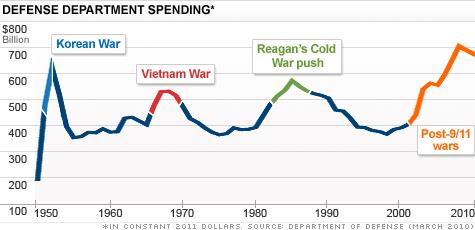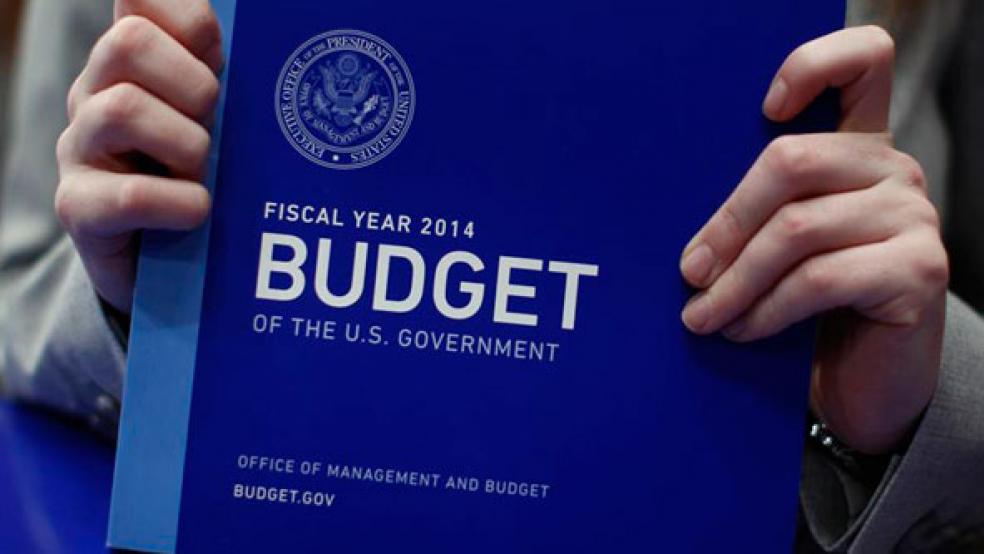For decades, the Republican Party has claimed the Defense Department as their own, labeling Democrats who wanted to trim the Pentagon’s budget or who questioned operations overseas as unpatriotic.

But in an age of austerity, the Pentagon is no longer a GOP sacred cow. Deficit reduction and cuts in spending have become the Republican Party’s mantra. The GOP has also tried to hide their defense policy shift: Paul Ryan’s budget, released yesterday, did not significantly cut defense spending, and House Republicans last week voted to reverse the defense cuts caused by the sequester. There are still some Hawks within the Republican caucus who staunchly oppose any cuts to defense spending. But privately, Republicans are acknowledging defense cuts are inevitable.
“Defense slides to the edge of the table once you’re out of war,” said Gordon Adams, a professor at American University and defense budget expert. “For Republicans, deficit and spending have now taken center stage.”
The shift away from absolute support for Republicans is a politically dangerous one: Military families have backed Republicans in recent years. But according to new information, that support is waning. This shift also reveals an historical truth previously ignored by voters: Since World War II, Republicans, not Democrats, have overseen defense budget cuts that drastically reduced the size of the military.

LOSING MILITARY SUPPORT
According to polling done by the Military Times, in 2003 some 53 percent of military families considered themselves conservative, and 57 percent were Republicans. This is a continuation of a pro-Republican trend that started during the Vietnam War.
But as the wars in Iraq and Afghanistan dragged on and the burden on military families increased, the trend began to reverse itself. In 2008, 47 percent of military families were conservative, and 50 percent voted Republican. In 2012, 47 percent of families continued to call themselves conservative, but the percent that voted Republican dropped to 44.
According to Jacob Stokes, a research associate at the Center for New American Security, this shift represents growing frustration with Republican national security policy over the next decade. This sentiment is likely to grow as Republicans sacrifice defense to cut spending.
“In the last decade, there is rightly a growing sentiment among service members that the hawkish foreign policy Republicans puts tough stress on the force,” he said. “There is a certain amount of reasonable questioning that’s asking if these things were completely necessary to protect the nation.”
THE REPUBLICAN DEFENSE MYTH
American University’s Adams says that the Republican branding as the party of defense is not based on fact. Instead, it’s a political myth that creative campaign managers have spread to discredit Democratic positions on national security.
“The Republican branding as the party of defense is a whole bunch of optics, not history,” said Adams. “There are people in the Democratic Party who have always been strong on defense. There are people in the Republican Party who want to cut defense.”
The Republicans’ ability to brand themselves as pro-defense tracks back to George McGovern’s anti-Vietnam campaign against Richard Nixon in 1968. It continued in the 1980s, when Ronald Reagan spent billions on defense during his first years in office. After 9-11, George W. Bush cashed in on the military’s good will toward Republicans to justify the Iraq war.
In fact, Adams said, Republican presidents have presided over every military drawdown since the end of World War II.

“Eisenhower decreased defense spending while in office. So did Nixon and George H.W. Bush, who oversaw the drawdown from 1989 to 1992,” Adams said. “Colin Powell (chairman of the Joint Chiefs under Bush) used to brag about how much they cut.”
Adams said the current debate in the Republican Party has been happening in one form or another for decades. The split between the hawks and doves, however, is becoming more apparent as the party struggles to redefine itself.
“There is a history here of Republicans being more concerned with the fiscal then they are about defense. The tensions you see are not surprising,” Adams said. “There’s always been a part of the party that thought fiscal discipline was a top priority, a higher priority than defense.”





